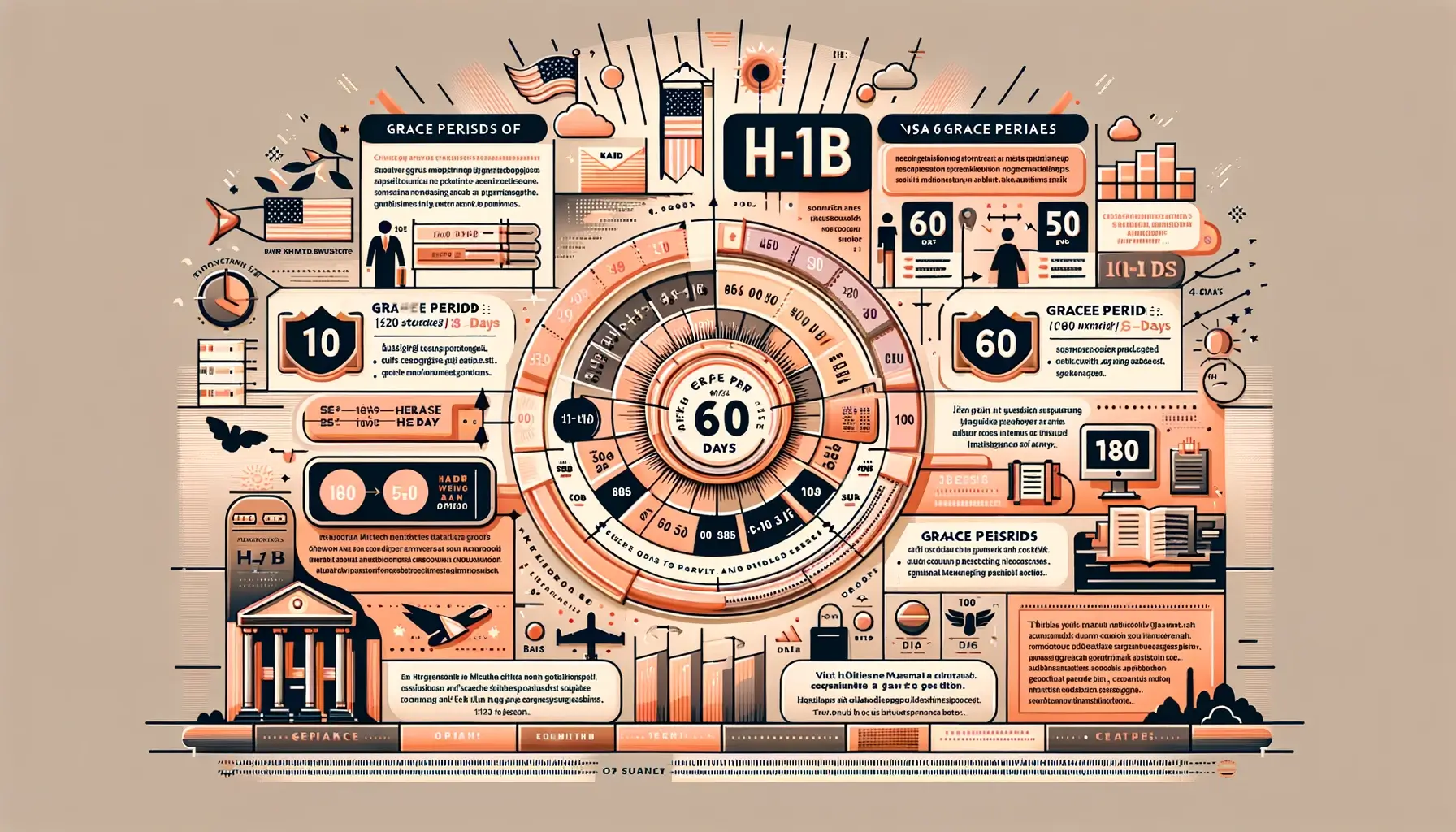
Introduction
The H-1B visa, a cornerstone of employment for foreign workers in the United States, carries specific stipulations that directly impact the legal status and livelihood of its holders. Among these, the concept of "grace periods" emerges as a critical lifeline for those who find themselves unexpectedly out of work. This article delves into the nuanced provisions of the H-1B grace periods—10 days, 60 days, and the mythical 180 days—offering clarity and guidance for navigating these pivotal times.
What is the H-1B Grace Period?
The H-1B grace period refers to designated time frames post-employment termination during which visa holders can seek alternative employment, change their visa status, or prepare to leave the U.S. without falling "out of status." These periods are pivotal for making informed decisions about one's future in the U.S.
Related videos:
The 10-Day Grace Period Explained
Contrary to common belief, the 10-day grace period is not a catch-all safety net but is specifically tied to the natural conclusion of the H-1B visa's validity. This period allows for personal affairs to be settled before departing the U.S. or transitioning to another visa status, but it does not permit employment.
The 60-Day Grace Period Explained
The 60-day grace period offers a broader window of opportunity, allowing H-1B holders to maintain their status while searching for new employment or adjusting their visa status. This provision underscores the U.S. government's recognition of the challenges faced by foreign workers and offers a buffer against immediate status loss.
The 180-Day Grace Period Explained
Despite circulating discussions, the extension of the grace period to 180 days remains a proposal, not a current policy. It's crucial to base decisions on existing laws and not on speculative future changes.
Strategies for Utilizing Your Grace Period Effectively
During the grace period, proactive steps—such as engaging in thorough job searches and exploring alternative visa options—can make a significant difference in securing one's status and future in the U.S.
Here is tips for Job searching
Update Your Resume and LinkedIn Profile
-
Highlight Achievements: Focus on recent achievements, quantifiable results, and skills relevant to your target roles.
-
Optimize for Keywords: Ensure your resume and LinkedIn profile are optimized with industry-specific keywords to increase visibility to recruiters.
Leverage Your Network
-
Reach Out to Contacts: Notify your professional network of your situation discreetly. Often, job opportunities come from personal connections.
-
Attend Industry Events: Whether virtual or in-person, industry events can be fruitful for networking and discovering hidden job opportunities.
Utilize Job Boards and Recruitment Agencies
-
Specialized Job Boards: Use job boards specific to your industry alongside general ones like LinkedIn, Indeed, and Glassdoor.
-
Recruitment Agencies: Consider registering with agencies that specialize in your field. They can often expedite the job search process.
Consider Contract or Temporary Positions
-
Bridge Employment: Contract or temporary positions can serve as a bridge, providing income and maintaining your status while you search for long-term opportunities.
Changing Visa Status: Options and Considerations
If securing a new H-1B position seems unlikely within your grace period, changing your visa status could be a viable alternative. Here are some options:
F-1 Student Visa
-
Further Education: Enrolling in further education allows you to change your status to an F-1 student visa. This option is suitable if you wish to enhance your qualifications or pivot your career path.
-
Considerations: Ensure the program is eligible for an F-1 visa and consider how it aligns with your long-term career goals.
O-1 Visa for Individuals with Extraordinary Ability or Achievement
-
Eligibility: If you have demonstrated extraordinary ability in your field (sciences, arts, education, business, or athletics), an O-1 visa might be an option.
-
Considerations: This requires substantial evidence of your achievements and recognition in your field.
B-1/B-2 Visitor Visa
-
Temporary Stay: If you need more time to arrange for your departure or plan your next steps, changing to a B-1 (business) or B-2 (tourism) visa might offer a short-term solution.
-
Considerations: Remember, you cannot work on a B-1/B-2 visa, and the intent should be clear and genuine.
Consult an Immigration Attorney
-
Professional Advice: Given the complexities of U.S. immigration laws, consulting with an immigration attorney can provide personalized advice and help you navigate the change of status process effectively.
Related articles:
FAQ:
What is the H-1B grace period?
The H-1B grace period refers to specific time frames allotted to H-1B visa holders after their employment ends, allowing them to seek new employment, change their visa status, or prepare to leave the U.S. without being considered out of status.
How long is the H-1B grace period?
There are two main grace periods: a 10-day period that is granted at the end of the H-1B visa's validity period for preparing to leave the U.S. or transition to another visa status, and a 60-day grace period provided if employment is terminated prematurely, allowing for job search or status adjustment.
Can I work during the H-1B grace period?
No, you cannot engage in employment during the grace periods. The 10-day grace period does not allow for employment at all, and while the 60-day grace period allows you to stay in the U.S. to find new employment, you cannot actually work until a new H-1B petition is approved.
Is there a 180-day grace period for H-1B visa holders?
No, as of the current regulations, there is no 180-day grace period for H-1B visa holders. The rumor of a 180-day grace period is based on proposals and discussions that have not been implemented into policy.
What should I do during the H-1B 60-day grace period?
During the 60-day grace period, you should actively seek new employment and have an employer file a new H-1B petition on your behalf, explore changing to another visa status, or make arrangements to leave the U.S. if you cannot find suitable employment or change your status
What happens if I can't find employment within the 60-day grace period?
If you cannot find employment or change your visa status within the 60-day grace period, you should prepare to leave the United States to avoid accruing unlawful presence, which can have severe consequences for future U.S. immigration applications.
Can I apply for a visa status change during the grace period?
Yes, you can apply for a change of visa status during the grace period, provided you meet the eligibility requirements for the new visa category. It is crucial to file the application before the grace period expires to maintain lawful status.
Does the grace period apply to all H-1B visa holders?
Yes, the grace period applies to all H-1B visa holders, but the applicability and duration depend on specific circumstances, such as the reason for employment termination and the timing relative to the visa's validity period.
Where can I find more information on maintaining status during the grace period?
For the most accurate and up-to-date information, consult the official website of the United States Citizenship and Immigration Services (USCIS) or seek advice from a qualified immigration attorney.


Leave Your Comment Here